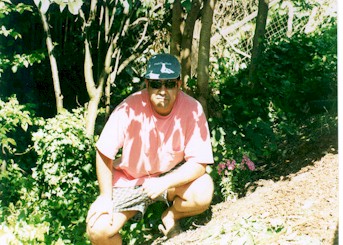Aleksander's Grandfather and the First of May
We are in Almaty, walking in the shadows of the soaring Tien Shan range. Across high valleys, to the south and west, lie Kyrghyzstan, and Bishkek. Our guide in these parts is Aleksander, a silver-haired former museum director, a 4th-generation Russian in Kazakhstan, who is to take us into the Tien Shans and the Alatau (i.e. Altai) which he knows like the back of his hands, for his family has been in them for 150 years. Midway up the northern Tien Shan lies Aleksander's mountain home with a 100m frontage of apple trees; from his front porch he can see far below in the plains, where the night train crosses the Dzhungarian Alatau towards Ust-Kamenogorsk, its front beam stabbing around like a flashlight as it negotiates the loops and the switchbacks of the track.
Ethnic Russians came into the area in the mid 1850s, once a Russian piedmont fort - Verniy - had been constructed at the base of the Zailiysky Alatau mountain range between the Big and Small Almatinka rivers. (Verniy became Almaty - from Alma-Ata, Apple-Father, for apples are from Kazakhstan.) Aleksander's great-grandfather was one of the early homesteaders, drawn from West of the Volga to the Central Asian frontier by easy land and opportunity. Between 1850 and 1910 the number of Russian peasants settled in Kazakhstan was over a million. Aleksander's grandfather grew up on the homestead in the high valleys, managing orchards of apples, peaches and apricots, or undulating fields of mountain-potatoes. The area was not collectivized at the same pace as the rest of the USSR; Sovietization would take till 1936 to catch up to Bishkek, so Aleksander's grandparents were allowed remain smallholding-farmers for a while.
One May-Day (solemnly celebrated as International Worker's Day in the Soviet union as in many other countries) in the late 1920s, as the village band was preparing to greet some bigwigs visiting from Bishkek, Aleksander's grandfather came out of his house in the morning, stamped his feet in exasperation, shouted "Damn this First of May!" and went back inside.
Neighbors heard him clearly. A few hours later, the police came and took him away.
Karlag (the Karaganda Corrective Labor Camp) was one of the largest Gulag labor camps, located in Karaganda Oblast, Kazakh SSR, USSR. About 800,000 inmates served in total in Karlag over its history. At the height of Stalin's terror, you could be denounced for almost anything and disappear into Karlag, essentially to be worked to death in the steppe.
Aleksander's grandma, as well as his mother and her siblings - waited in trepidation for the worst. They did not join the May Day festivities, expecting to be picked up at any time, as the "family of the traitor" could easily suffer the same fate as the principal. In the late afternoon, his grandma gathered up enough courage to go to the village ataman's house. He did not open the door, and made the sign of the cross from behind his lace curtains.
The next day passed, all eyes were red from crying. At midnight, there was a great whinnying of horses outside the gate. Footsteps crunched in the gravel. The women adjusted their kerchiefs, hid bits of cheese and black bread on their persons, and huddled at the stove, expecting the worst - denunciation, deportation, rape, enslavement. The door opened and Aleksander's grandfather came in. The other footsteps retreated away into the night.
He went straight to bed without speaking a word.
When he woke well past noon the following day, he saw his entire family sitting around his bed wordlessly; they had kept a soundless vigil all night next to his cot. It took three days for his story to come out.
A neighbor had denounced him for blasphemous irreverence towards May Day. After arrest, he spoke to higher and higher levels of officers in the Soviet security apparatus and tried to impress upon them his version of the story, viz: It had snowed overnight! On the eve of the first of May! the apple crop was done for, with the frost and all. Damn a snowfall on the first of May!
He had been passed up the chain by one official after another, and finally he had been granted an interrogation by the highest-ranking NKVD person of the oblast. Aleksander's grandfather sat across the Commissar of Internal Security Himself. The Great Man surveyed him impassively and inscrutably smoked cigarette after cigarette. Finally he said: my mother said the same thing!
Excuse me, Your Excellency!
My mother, you oaf. She's from rural-stock too, a farmer's daughter. When she came out yesterday in Bishkek she saw the snow and said the same thing - damn a first of May that snows! So I believe you. You can go.
Below: fields of wildflowers in the mountains south of Almaty, as we drive up with Aleksander towards the Kazakh-Kyrghyz border.



0 Comments:
Post a Comment
<< Home